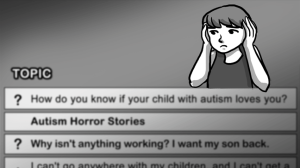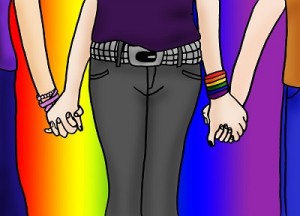When I first came out as transgender, I was surprised to find that many people in my life wanted to support me. I received a lot of encouraging words, often from the folks I least expected.
It meant the world to me to be surrounded by people who just wanted me to be myself and be happy! In a society that can often be so hostile towards transgender people, having loved ones in our corner can make all the difference.
But I quickly realized that there’s a distinction between stating your support and actually respecting my identity. A lot of people talked the talk – but that didn’t always translate when it came to actions.
I wanted to be patient with my loved one because I knew it was a learning process for everyone. But as time went on, some problematic behaviors never seemed to go away.
These behaviors – some of which were so subtle I’m not even sure they realized it – told me they may know that I’m transgender, but they didn’t really validate, believe, or respect me.
Maybe they didn’t know how. Maybe they were still caught up in their own feelings about it. Or maybe they really believed that they weren’t being hurtful.
But as I so often write, someone’s intentions aren’t as important as the impact that they ultimately have. You may not have meant to step on someone’s toes – but that doesn’t make it hurt any less!
Oftentimes, as we try to support the people we love, we can make mistakes – and that’s a normal and expected part of the process. And the best way to make it right is to learn a little more, do some self-reflection, and not just apologize, but commit to changing our behaviors.
Because supporting the people we love isn’t just about saying that we support them – it’s about doing the work to be supportive!
If you aren’t sure how, that’s what I’m here for.
Let’s talk about six signs that you might be disrespecting a transgender person in your life – and some ideas for how to do better next time.
1. You Still Misgender Them Behind Their Back
Maybe this scene is familiar to you: You’re talking to someone about your loved one, and when it’s time to use a pronoun, you stumble for a moment. He? She? They? How do I gender them?
In a panic, you resort to the wrong pronouns, with just the slightest pang of guilt in the pit of your stomach.
Why We Do It: You might be thinking that you aren’t really ready to educate this person about your loved one, and about what it means to be transgender. It would be easier, you decide, if I just misgender them – so I don’t have to get “into it,” or answer any uncomfortable questions.
But misgendering someone after they’ve asked that their pronouns be respected – unless they say otherwise – is never okay (I’ve written a whole article on why, which is worth the read).
It’s like saying: “I’d rather harm my loved one – and teach someone else to harm them – than deal with the temporary discomfort of navigating this situation.”
Instead: There are so many great resources (you can start with this guide) that can help you better understand and educate others. Nothing says “I love you” quite like taking the time to be informed and help inform others, so that your loved one doesn’t have to shoulder that burden alone.
And if nothing else, remember you don’t have to answer questions – just affirm your loved one by saying, “These are the pronouns [Insert person’s name] uses now. I hope you’ll respect that.”
Your discomfort in that moment doesn’t compare to the real harm that misgendering can do!
2. You Don’t Respect the Boundaries They Set
I knew a transgender person who asked her parents to take down a photo from her childhood because it was painful to look at photos of herself prior to her transition and because every guest in their home would gawk at the picture of her “looking like a boy.”
Time and time again, they argued about it.
Her parents loved that photo so much they didn’t want to take it off the wall – it reminded them of happy times together, and they couldn’t understand why she wouldn’t be happy when she looked at it, too.
I can’t tell you how many times I’ve heard about the families of transgender people not really respecting the needs of trans people.
Why We Do It: There can be a lot of reasons for this. Most often, I see this in loved ones who are having a difficult time letting go of the past. This is a normal part of coming to terms with someone’s transition – which is understandable, but still not acceptable.
Here’s the thing: When a transgender person says that something is triggering, we should respect those boundaries. If something is hurtful, the “why” isn’t what’s most important – what matters is we’re harming someone, whether it was purposeful or not, and now we have the chance to make it right.
In the case of my friend, she started to feel like her parents thought their happiness was the only thing that mattered – and that her pain wasn’t important or real.
Transgender people set boundaries because they’re trying to navigate very painful situations. They may ask to not talk about certain topics, not be called by certain names, or try not to revisit certain parts of the past.
This isn’t to offend you.
It’s because we’re trying to heal after struggling to accept who we are, and we need the space to be ourselves without being constantly reminded of that struggle.
Instead: When your loved one sets a boundary, respect it. It’s really as simple as that.
And a helpful hint: If you’re struggling with your feelings around their transition, that’s totally okay! But it’s important to process that on your own time – maybe with a therapist, in your journal, or in conversation with someone you trust – without burdening your trans loved one in the process.
3. You Try to ‘Bargain’ with Them
I see this all the time with loved ones who are having a tough time dealing with their transgender loved one’s transition. I’ve personally experienced it, too:
- “You can start hormones, but please don’t get surgery.”
- “I’ll call you by that name, but only at home.”
- “You can wear a dress, but you can’t wear it to school.”
Why We Do It: Sometimes, this comes from a place of wanting to protect someone. Other times, it’s because you feel emotionally unprepared for the steps ahead. These are very understandable emotions – but that doesn’t mean acting on those feelings is okay.
Asking your loved one to accommodate you, rather than encouraging them to be the most authentic and happiest version of themselves, is harmful.
It’s a gesture that can be easily misunderstood – as if to say “My comfort matters more than yours” or “I’m not actually okay with this after all.”
And it’s a big red flag.
It tells me that rather than working on that discomfort and processing your fears, you’re asking your loved one to change for you and ultimately endure more suffering on your behalf.
It unfairly places the burden on them, instead of challenging you to work through your feelings about their transition.
Instead: When you feel the urge to bargain, ask yourself: “Is this about what my loved one needs to be well, or is this about what I need to feel comfortable or safe?”
At the end of the day, their transition isn’t about you.
Transitioning isn’t a negotiation between the two of you – it’s the sole decision of a transgender person and their right to their own body and autonomy.
4. You Make Excuses Instead of Apologizing
If you have a transgender loved one, “sorry” will become a very familiar part of your vocabulary.
I say this because the learning curve can be very steep and because every trans person is uniquely different in what they need and expect.
Even as trans myself, I’ve stumbled many times over what to say or do for the other transgender people in my life, especially when they first came out to me.
Why We Do It: It can be really difficult to admit when you’ve messed up. It can make you feel like a bad person – and feeling guilty about this can be uncomfortable to sit with. This is why many people with transgender loved ones can wind up very defensive.
But being defensive about your mistakes serves no one.
It doesn’t push you to learn or do better, and it can lead your loved one to believe you don’t feel remorse or regret – which is often quite the opposite of what you’re actually feeling! This is what defensiveness can sound like:
- “I can’t help that – I’m still learning! You should be more patient!”
- “You expect way too much of me. You need to lower your expectations.”
- “If you’d just teach me instead of getting angry, we wouldn’t have these problems.”
Have you ever said something like this before?
Notice how your mistake is suddenly the fault of your loved one – and how deflecting responsibility means you never actually take ownership of the harm you’ve caused.
Instead: Realize that making a mistake doesn’t make you a bad person. The real issue is when you’re unwilling to make it right. Take a deep breath, acknowledge the issue, and commit to doing better. It’s simple!
It helps to learn how to give a proper apology, and to know when a situation just calls for a quick correction (like misgendering in conversation), or when a situation requires deeper reflection (like the examples in this article!).
5. You Center Your Feelings and Disregard Theirs
This is far and away one of the most common mistakes I’ve seen loved ones make. If this sounds like you, trust me – you aren’t alone!
- “This isn’t easy for me, either!”
- “Hard on you? I feel like I’ve lost my daughter/son.”
- “You aren’t the only one feeling hurt.”
Why We Do It: I think it’s a very human thing to want our pain to be acknowledged, and a gender transition can definitely come with a lot of grief and confusion for loved ones. The difference here is whether or not it’s an appropriate time to ask for our pain to be seen.
A lot of the time, we’re trying so hard to keep that pain to ourselves that it comes out at the wrong time. We wind up blurting it out at the most inopportune moment, most often when our loved one is trying to have their suffering acknowledged.
This also stems from a place of resentment – that if only they had stayed the same, we wouldn’t have to deal with all of the emotions coming up in this transition.
But remember: This isn’t about you. They aren’t transitioning to upset you – they’re transitioning because this is what they need to be a happy, whole person.
Instead: Get a therapist. Write in a journal. Find a friend or loved one to process with. Join a support group. Whatever you do, don’t blame your loved one for your struggle to come to terms with their transition.
When you decenter their needs and prioritize yours, you’re putting a wedge between you that’ll only hurt you both.
6. You Say That You Don’t ‘Get It’ – But You Also Don’t Try To
I hear so many loved ones talking about how they don’t “understand” the whole “transgender thing” – but when I’ve asked if they’ve done any reading or watched any videos, they tell me they haven’t.
On the surface, this seems like a funny little contradiction. They say they don’t understand, but they’re also not trying to.
Why We Do It: Most often, when loved ones don’t take the time to educate themselves, it’s because they’re avoiding reality. They don’t know how to deal with the feelings that come up when they think about their loved one’s transition – so they pretend, as often as possible, that this transition isn’t happening.
But that doesn’t help anyone. It means that loved ones remain in the dark, and transgender folks remain misunderstood.
That’s a divide that ultimately strains the relationship – and makes trans people feel unloved, uncared for, and unimportant.
Instead: Here’s the good news: You’re already doing the “instead” part (go you!).
You’re reading this article. That means you’ve decided it’s time to start processing your feelings, and you’re making an effort to connect with your loved one as they are – and not how you wish they could be.
Remaining grounded in the here and now – accepting and affirming them for who they really are – is how you can build a more respectful and healthy relationship based in unconditional love and trust.
The fact that you’re taking the time to reflect on the ways in which you might be doing harm tells me that you care – and is the first of many steps I know you’ll take to do right by your loved one.
And that, my friend, is not something to feel bad about. That’s something to celebrate.
[do_widget id=’text-101′]
Sam Dylan Finch is a Contributing Writer at Everyday Feminism. He is a transgender writer, activist, and educator based in the San Francisco Bay Area, exploring the intersections of mental illness and queerness. He is also the founder of Let’s Queer Things Up!, his beautifully queer blog. You can learn more about him here and follow him on Twitter @samdylanfinch. Read his articles here.
Search our 3000+ articles!
Read our articles about:
Our online racial justice training
Used by hundreds of universities, non-profits, and businesses.
Click to learn more





















